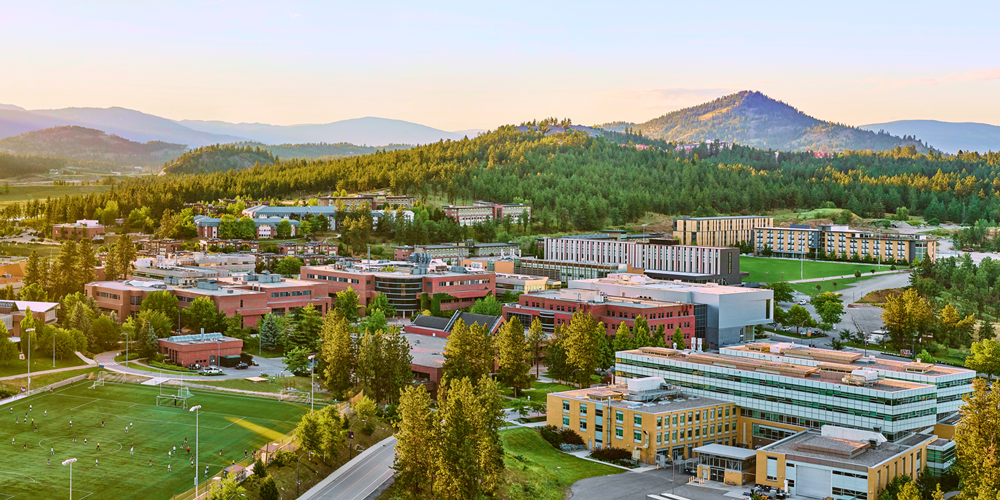Master of Biotechnology (MBtec)

Irving K. Barber Faculty of Science
| Program | Components | Length |
|---|---|---|
| Master of Biotechnology (MBtec) | Coursework and Internship | 16 months |
Why study Biotechnology at UBC Okanagan?
The Master of Biotechnology is designed to equip students with the skills and knowledge needed to thrive in the Biotechnology industry.
This program delivers a comprehensive education in disciplines that are core to Biotechnology, while also emphasizing life-long skills in critical thinking, hypothesis testing, project management, leadership and communications.
Fast Track Timeline
The MBtec is a 16-month, course-based Master’s program.
Program start date: September 2, 2025.
Hands-on Experience
The MBtec includes 21 credits of hands-on, laboratory-based courses complemented by seminar courses comprised of presentations from expert industry speakers. Students will further develop their skills as they complete two four-month internships.
Fulfill High Demand
A comprehensive scan of historical job postings from 2013 to 2023 revealed 5,748 Biotech openings in BC, 44% of which required a graduate degree.
Economic Impact
The BC Biotechnology industry is booming. In 2021, B.C.’s life sciences sector recorded $6.7 billion in revenue, an increase of 13.6% from 2020.
Students will receive training in microbial, plant, and animal cell culture, production of biological therapeutics and advanced techniques including organoid production, CRISPR-mediated gene editing, protein expression and metabolomics.
BTEC 500: Professional Seminar
Technical writing and oral communication skills for the biotechnology industry. Project management, resource management and leadership. Invited speakers highlighting innovation and entrepreneurship strategies.
BTEC 501: Professional Seminar II
Current topics in industrial biotechnology practice and innovations. Regulatory compliance, intellectual property, and ethics. Invited speakers highlight current trends and experiences in the field.
BTEC 504: Molecular Cloning Laboratory
Extraction, purification and analysis of DNA, RNA, and protein. Bacterial culture techniques. Production of recombinant DNA and transformation of bacteria.
BTEC 505: Cell and Tissue Culture Laboratory
Aseptic culture of plant and animal cells and tissues. Establishment, manipulation, storage, and analysis of cultures. Detection and control of contaminants. Applications of cell culture in research and pharmaceutical manufacturing. Regeneration of plant organs.
BTEC 506: Advanced Biotechnology Laboratory
Student-directed projects integrating techniques at the forefront of biotechnology such as organoid production, CRISPR-Cas9 gene editing, recombinant protein optimization, cryopreservation, and culture of recalcitrant or exotic species.
BTEC 509: Computational Biology
Analysis of nucleic acid sequences using command-line computer programs. Use of biological databases. Structure and evolution of genomes.
BTEC 590: Biotechnology Internship I
Approved and supervised paid work experience with a public or private organization for a minimum of 455 hours full time. Internship assignments are required. Restricted to BTEC students who have secured a work-term with an appropriate employer either independently or through the Co-op Office.
BTEC 591: Biotechnology Internship II
Approved and supervised paid work experience with a public or private organization for a minimum of 455 hours full time. Internship assignments are required. Restricted to BTEC students who have secured a work-term with an appropriate employer either independently or through the Co-op Office.
BTEC 592: Biotechnology Internship III (Optional)
Approved and supervised paid work experience with a public or private organization for a minimum of 455 hours full time. Internship assignments are required. Restricted to BTEC students who have secured a work-term with an appropriate employer either independently or through the Co-op Office.
Year 1
| September – December (on-campus) |
January – April (in community) |
Summer (on campus) |
| BTEC 500: Professional Seminar I |
BTEC 590: Biotechnology Internship I |
BTEC 501: Professional Seminar II |
| BTEC 504: Molecular Cloning Laboratory | BTEC 506: Advanced Biotechnology Laboratory | |
| BTEC 505: Cell and Tissue Culture Laboratory | BTEC 509: Computational Biology |
Year 2
| September – December (in community) |
January – April (in community) |
|
| BTEC 591: Biotechnology Internship II |
Optional: BTEC 592: Biotechnology Internship III |
Faculty
Program Coordinator
Michael Deyholos
Professor | Biology
michael.deyholos@ubc.ca
Lecturers
This list will be updated as faculty assignments for courses are confirmed.
Please note: the Master of Biotechnology program does not require applicants to connect with a faculty supervisor
Careers and Outcomes
The Master of Biotechnology program provides learners with backgrounds in Biology, Chemistry and Biochemistry with the expertise needed to access mid- to high-level industry positions.
- Biologist and scientists
- Science/lab managers
- Research associate in biochemistry, tissue cell biology, biopharma, agricultural tech
- Associate scientist in biologics discovery, research and development, quality assurance
- Associate lab manager in agricultural tech, biopharma
- Research technologist in biochemistry, tissue cell biology, biopharma, agricultural tech
Upon successful completion of the Master of Biotechnology students will be able to:
- Separate, identify, and quantify macromolecules;
- Produce recombinant molecules and transgenic organisms;
- Propagate microbial, plant, and animal cells and tissues in aseptic culture;
- Implement and troubleshoot detailed laboratory protocols, reproducibly and independently;
- Use command-line programing to analyze biological data;
- Explain the chemical, physical and biological principles underlying laboratory methods;
- Demonstrate knowledge of operational, regulatory, and safety standards relevant to the laboratory environment;
- Communicate effectively in written and oral presentations;
- Apply project management skills to ensure effective use of time and resources;
- Explain key considerations, opportunities, and challenges related to entrepreneurship and innovation;
- Discuss social, ethical, and environmental considerations relevant to biotechnology;
- Demonstrate collaborative and respectful dialogue, ethical research practices, and the integration of Indigenous knowledge into their professional and personal endeavours.
Tuition and Funding
Domestic: $3,750 per term for a total of $15,000
International: $10,000 per term for a total of $40,000
All MBtec students are also required to pay a laboratory fee of $500 per semester.
Please be advised: UBCO tuition rates are expected to increase in May 2025. This increase will add approximately 2% to the above rates.
Global and Close-Knit
At UBC Okanagan, you gain all the benefits of attending a globally ranked, top 5% university while studying in a close-knit learning community. 50% of graduates, from all across the globe, choose to stay in the region.

Discover the Okanagan
A diverse natural region with sandy beaches, beautiful farms, vineyards, orchards and snow-capped mountains, the Okanagan is an inspirational landscape perfect for those seeking leisure or outdoor adventure.
UBC's Okanagan campus borders the dynamic city of Kelowna, a hub of economic development with a population of more than 150,000 people— the fourth fastest-growing population in Canada.


